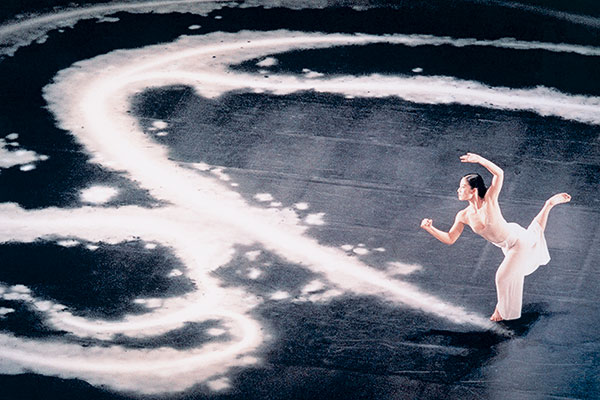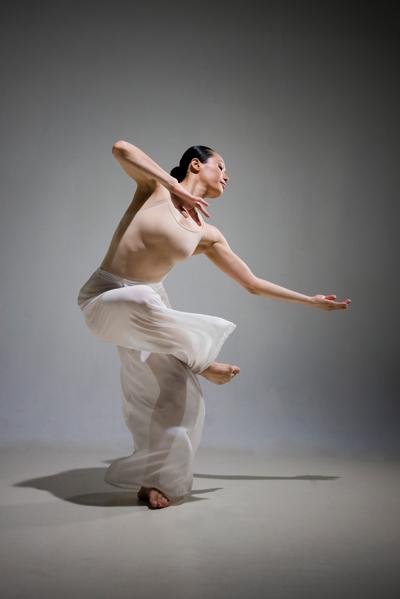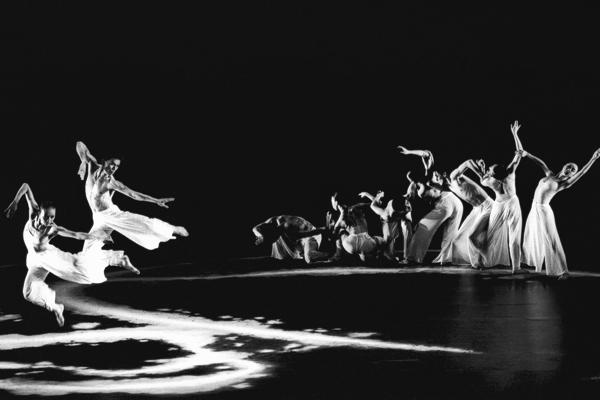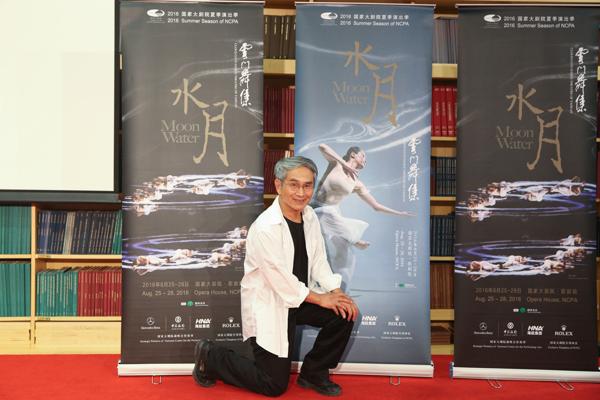
Taiwan dancer Chou Chang-ning performs in an earlier version of Cloud Gate Dance Theatre’s Moon Water. The dance will make its debut at the National Center for the Performing Arts in Beijing on Aug 25.[Photo by Teng Hui-en/China Daily]
On a stage with white stripes painted on a black floor, resembling ripples created by water, dancers in loose white pants seem to make their bodies flow. They rise and fall as if mimicking breathing, which seems as if the audience and the dancers are breathing in unison.
A wall of mirrors reflects the dancers’ moves on water, which quietly floods the stage. The sound of flowing water resonates with Bach’s Six Suites for Solo Cello.
This is a scene from the critically acclaimed contemporary dance piece Moon Water by Taiwan-based choreographer Lin Hwai-min performed by dancers of Cloud Gate Dance Theatre, which Lin founded in 1973.

Since its premiere in 1998, Moon Water, a contemporary exploration of tai chi, an ancient Chinese physical and breathing exercise, has been staged nearly 200 times across the world.
Later this month, it will make its debut at the National Center for the Performing Arts in Beijing.
“Like many of my works, this one also came out of nowhere,” says the 69-year-old Lin. “I never planned it and never had a script.”
It all started in the 1990s when Lin decided to make some changes in his dancers’ daily training schedule. He told the dancers to sit, close their eyes, breathe and meditate using tai chi techniques.
“Since all my dancers were trained in classical ballet, folk dance and contemporary dance, they wanted to move and they hated my idea. So, I had to choreograph something for them to practice, which worked like a carrot for a horse,” says Lin.
One day during a tour in Munich, Lin walked around with his colleague, set designer Austine Wang, and he saw a long stretch of mirrors on a street.
“Why don’t we have mirrors onstage?” Lin asked the set designer.
That night, while taking a shower in his hotel, the splashing of the water inspired Lin.
“Wouldn’t it be great to have water onstage?” he thought.
Lin discussed the idea with Wang, who was next door.
With the support of Wang, who realized Lin’s vision onstage, the choreographer combined the principles and moves of tai chi, such as slowly squatting, standing up and breathing with contemporary dance, which gave birth to Moon Water.
“When things click, they go to the place as we want them,” says Lin, who borrowed the well-known Chinese saying, “flowers in the mirror and the moon on the water are both illusory” as the title for the piece, meaning that everything in life is illusory, while delivering the message of tai chi that “energy flows like water while the spirit shines like the moon”.

He also chose Mischa Maisky’s recordings of the Bach pieces, which he used to train the dancers for the performance.
“I thought about not using Bach’s music because I thought it was too risky. But it was also a tempting idea because I had been listening to Bach for more than 20 years, and he is my favorite composer,” says Lin, adding that the interpretation of celebrated cellist Maisky is full of energy.
In 2003, the New York Times selected Moon Water as “the best dance of the year” and it was also featured at the Sydney 2000 Olympic Arts Festival and 2010 Vancouver Cultural Olympiad.
“I guess the reason why Moon Water is enjoyed by people around the world is that the audiences can breathe together with the dancers. That’s the power of tai chi,” says Lin.
As a young adult, Lin, who holds a master’s degree in fine arts from the University of Iowa, had a successful career as a writer, publishing works of fiction and essays.
While studying in the US, he took modern dance classes and started choreographing, which took him back to dance, a passion he has had since the age of 5 after watching the famous British ballet film, The Red Shoes.
After launching Cloud Gate Dance Theatre, Lin founded the Cloud Gate Dance School in 1998 and Cloud Gate 2 in 1999 to encourage young choreographers in Taiwan.

All of Lin’s works are seen as a message for his audiences, which is like “writing with bodies in space”.
In Legacy, the company’s first full-length production in 1978, he portrayed families, which had left the mainland and moved to Taiwan hundreds of years ago.
In Songs of Wanders, which was inspired by Lin’s pilgrimage to Bodh Gaya in India in 1994, he used 3.5 tons of rice grains onstage.
“Each of our works is a result of random thoughts. I never plan anything,” says Lin, recalling his dance company’s achievements.
He also attributes the success of his dance company to the dancers, who Lin describes as “dancing differently from other companies in the world”.
“Some of my dancers have been working with me for 20 years. They bring our works to life, though some of them have been performed hundreds of times,” he says.
Contact the writer at chennan@chinadaily.com.cn
If you go
7:30 pm, Aug 25 to 28. National Center for the Performing Arts, No 2 West Chang’an Avenue, Xicheng district, Beijing. 010-6655-0000.
